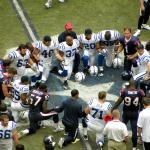Complex status dynamics are woven into the fabric of human society. These dynamics, deeply rooted in sociology and social psychology, influence not just secular social structures, but also religious bodies, including the church. As individuals with varying levels of social, economic, and cultural capital interact, an intricate web of relationships is formed, leading to the emergence of implicit hierarchies.
For those engaged in the life of the church, understanding these dynamics is vital. Building on the previous comments (here and here), this post explores how status affects the church and why discerning these dynamics has profound theological and practical implications.
The Church is a Social Entity
Many Christians assume that we should not be concerned about status since all believers are theoretically considered the same in Christ. This is a noble ideal, reflecting the New Testament’s teaching that all believers are equal in God’s eyes (e.g., Galatians 3:28). However, the reality is far more complex, as we’ve seen in the previous posts (part one, part two)
Sociological and social psychological research demonstrates that status dynamics are an inherent part of human social interaction. People naturally categorize others based on assorted values and attributes like wealth, occupation, education, and even religious commitment. These categorizations affect interpersonal interactions, group cohesion, and organizational structure.
The church is not isolated from societal influences.
Status dynamics invariably play a role within Christian communities. A congregation consists of individuals from diverse backgrounds, carrying with them the social norms and values that shape their behavior. This landscape leads to unintentional biases and hierarchies within the church.
The theological ideal of equality in Christ is central to biblical teaching. However, it’s far more difficult to translate this aspiration into practical reality since church members are still influenced by ingrained societal norms. Research on implicit bias shows that individuals often act on subconscious prejudices, even when consciously committed to equality.
The Theological Glimpse at Status
An entire book could be written unpacking a theology of status. For now, I’ll highlight a few ideas that trace the contours of such a work.
-
Equality in Christ
The Bible emphasizes that all are equal in the eyes of God (Galatians 3:28). Yet, status dynamics can create a chasm between members, leading to divisions that are contrary to the unity Christ seeks to foster. By examining and challenging these dynamics, the church can work towards a genuine reflection of the kingdom of God, where honor and shame are viewed through a biblical lens.
-
Love and Humility
Jesus exemplified love and humility, washing the feet of his disciples and embracing those marginalized in society. Understanding status dynamics enables the church to identify and break down barriers, fostering a community where love, service, and humility are prioritized over social standing.
-
Missions and Evangelism
In the field of missions, being aware of status dynamics helps missionaries and ministry leaders to engage appropriately with different cultures. This nuanced approach can facilitate more effective communication of the gospel.
As we’ve discussed, the desire for status (e.g., approval, acceptance, recognition, etc.) is fundamentally human. Status serves a social function. But Ridgeway adds,
“But the desire for status is never really satiated because it can never really be possessed by the individual once and for all. Since it is esteem given by others, it can always, at least theoretically, be taken away.” (Ridgeway, 60)
This profound statement is an ever-present warning as we theologize and pursue Christ.
Ignore or Engage Status?
Ignoring status dynamics or pretending they don’t exist in the church inevitably leads to a failure to address underlying tensions and inequalities. Marginalized voices get overlooked. Cliques and divisions develop, which runs contrary to the biblical vision of unity and love.
Furthermore, a lack of awareness of how status works can hinder effective outreach and evangelism, as missionaries and church leaders can fail to connect with diverse social groups in their surrounding community.
Rather than ignoring status dynamics, the church should actively engage with them.
Recognizing this social reality allows for a more nuanced understanding of how people interact within local churches. Also, a more robust understanding of status can guide intentional efforts to build a community that reflects Christ’s teachings, emphasizing love, humility, and service over social status.
Practical Implications
It’s worth commenting on a few practical implications that deserve far more reflection than I’ll offer here.
-
Church Leadership and Decision Making
Church leaders must be aware of how status dynamics can affect decision-making processes. Ensuring that decisions are not unduly influenced by social or economic status promotes transparency, inclusiveness, and a sense of shared ownership within the congregation.
-
Community and Fellowship
Recognizing status dynamics allows for the intentional fostering of a community where all members feel valued and included. This can be accomplished by implementing measures that minimize disparities, such as diverse representation in leadership and intentional outreach to marginalized groups.
-
Social Justice and Advocacy
The church is called to be a voice for the voiceless and a defender of justice. Understanding how societal structures contribute to inequality enables the body of Christ to engage in advocacy and outreach that reflect Christ’s compassion and commitment to justice.
Conclusion
The belief that Christians should not think about status because we’re all the same in Christ is well-intentioned but overlooks the complex interplay of social forces that shape human interaction.
Acknowledging and understanding status dynamics, guided by sound sociological and psychological research, enables the church to work toward a community that lives out the biblical principles of equality and unity. Rather than a stumbling block, this awareness can be a tool to help the church reflect the kingdom of God more fully in a world marked by divisions and disparities.
Status dynamics, though subtle and often overlooked, play a significant role in shaping the life of the church. By understanding these dynamics, believers can strive toward a more authentic expression of Christ’s love and humility. The theological grounding in love, equality, and mission offers a foundation from which to approach these complex issues. Practically, this awareness can influence leadership, community building, and social justice efforts.
Christ’s followers must continue to engage with this topic, holding fast to the biblical principles of honor and shame, and seeking wisdom in how to navigate a world marked by disparities. In doing so, the Church can be a beacon of hope, embodying the very essence of the gospel in a world in need of redemption and reconciliation.















